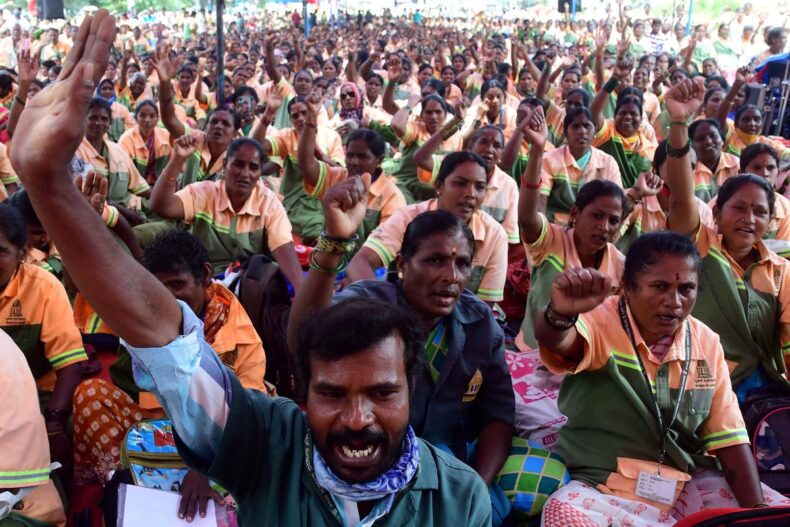Pourakarmikas are in charge of keeping the city clean. Thousands of pourakarmikas sweep the streets, pick up trash, and maintain the cleanliness of the cities, towns, and villages every morning throughout Karnataka. However, they have been deprived of their most fundamental rights and forced to work inhumane hours as contract workers for decades.
In March 2017, the State Cabinet, under the leadership of former Chief Minister Siddaramaiah, abolished the contract system for pourakarmikas and brought them under the direct payment system after a protracted battle and numerous strikes.
The Special Recruitment Rules for Pourakarmikas – 2017 were subsequently introduced by bureaucrats, who limited the definition of pourakarmikas to those who sweep the streets. In contravention of the Cabinet decision, other employees engaged in tasks such as drain cleaning, rubbish collection, truck driving, loading, and assistance with vehicles used for solid waste management were nonetheless employed.
Working seven days a week without the required breaks, holidays, social security benefits, or basic safety gear exposes these employees to a number of workplace risks that can cause both short-term and long-term problems with their physical and mental health. Additionally, the Scheduled Castes and Scheduled Tribes, who are structurally repressed and denied access to social dignity, education, and decent housing, make up the majority of Pourakarmikas.
Workers are categorised as permanent, direct payment, contractual, outsourced, and daily wage workers in state statistics provided by the Karnataka Safai Karamchari Commission before the July 1 strike.
In the state, there are a total of 12,387 loaders and other cleaners, 41,373 pourakarmikas, and 752 UGD assistants. Only 26,349 of them, including 16,516 pourakarmikas who work for the BBMP, are directly paid. Meanwhile, 10,200 of the 11,916 loaders and cleaners who are still employed under contract do so for the BBMP.
On Monday, the State government decided to make the pourakarmikas, who are currently contract workers, permanent employees.
After Chief Minister Basavaraj Bommai visited with the pourakarmikas, who had been agitating for permanent employment, the State Cabinet made the decision. According to sources, the Cabinet has approved the employment of 11,133 pourakarmikas under a unique recruitment plan.
Additionally, according to sources, they will be appointed with a monthly compensation range between $17,000 and $28,890.
The Cabinet gave its approval on Monday to the submitting of the proposed legislation in response to Mr. Bommai’s announcement in the Legislative Assembly last week that a new law will be introduced to make Kannada mandatory.
The Karnataka State Civil Services (Regulation of Transfer of Teachers) Act, 2020 was amended by the Cabinet, and these changes will permit mutual transfers.
The Cabinet has also approved a second modification to the Karnataka Secondary Education Examination Board Act that will allow the SSLC board and Pre-University Board to unite.
Additionally, the Karnataka Land Revenue (Second Amendment) Bill, 2022 and the Bengaluru Metropolitan Land Transport Authority Bill, 2022 were approved.
According to reports, the Chief Minister Vidya Nidhi plan would be extended to include children of fishermen starting in 2022–2023.
The “Arkavathy redo” case will be examined
The Cabinet allegedly examined the suspected anomalies in the “Arkavathy redo” issue during the Congress government led by Siddaramaiah as the Congress attacked the BJP government over allegations of corruption.
According to the information obtained, the Cabinet considered the matter and decided to review the case.
According to sources, the Justice H.S. Kempanna Commission’s report on the denotification problem in Arkavathy Layout was also discussed by the Cabinet.
Cases against BJP employees will be dropped
On the basis of the recommendations of a Cabinet subcommittee, the Cabinet also resolved to drop the criminal charges brought against 35 individuals. These allegations have been made against BJP members, Hindu, Kannada, and farmer leaders.
Therefore, even though the wage is provided directly by the government through the appropriate local bodies, it falls far short of providing for the families of the pourakarmikas’ most basic needs, including food, housing, healthcare, and education for their children. This is especially true in a city like Bengaluru. Inadequate working conditions have been denounced by activists and union members, who claim that they violate the Constitution’s fundamental principles and have called for a reduction in pay, status, facility, and opportunity disparities.












